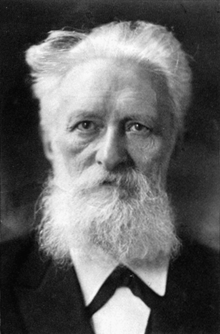Noology
The term noology (from the Greek noein = to think), which goes back to school metaphysics in the 17th century, can best be described as a form of spiritual teaching. It was also used by Atlas Crusius and the Scottish philosopher Thomas Reid . Later he played a role in the work of the German philosopher Rudolf Christoph Eucken . Eucken called his philosophy noology because, in his opinion, it relates to the "spirit that encompasses the world and soul" . In his opinion, the noological method enables an "ascent of reality" to an "inner unity and full independence" . According to Max Scheler , this should prevent scientific thinking from becoming detached from other cultural processes. The noological method is opposed to the psychological method, which starts only from human consciousness.
The term was also used as a structuring principle for philosophical, political and ethnological areas.
An argument to be found especially in Augustine is also occasionally called "noological proof of God ". In simplified form, it proceeds according to the following scheme: I recognize truths. These truths have certain perfections: necessity, eternity (etc.). The coming of perfections cannot be explained by instances that do not have them or have them to a lesser extent. There must be something that explains my knowledge of eternal truths and is itself to the highest degree eternal (etc.). This is there, it is the truth itself, and this is God.
Individual evidence
- ↑ Cf. in particular Augustine: De libero arbitrio 2, 3-13 and De vera religione 29-31. See for example: Martin Grabmann: The divine ground of human knowledge of truth according to Augustine and Thomas von Aquin , Münster 1924; Richard Heinzmann: Philosophy of the Middle Ages , W. Kohlhammer, Stuttgart 1. A. 1992, 3. A. 2008, ISBN 3170205803 , p. 74ff.
